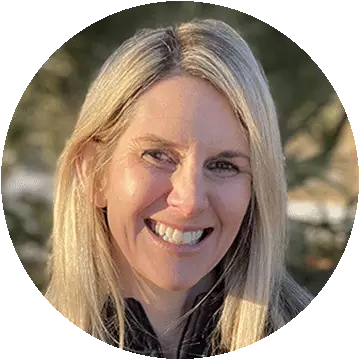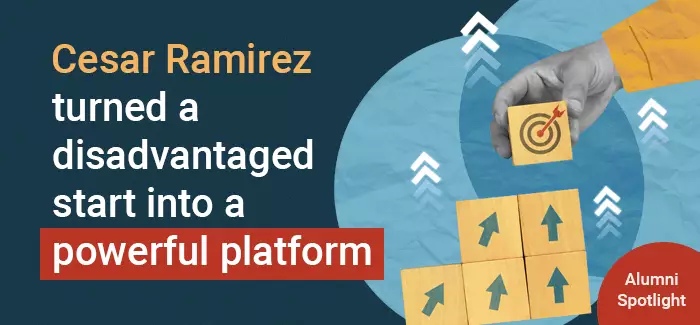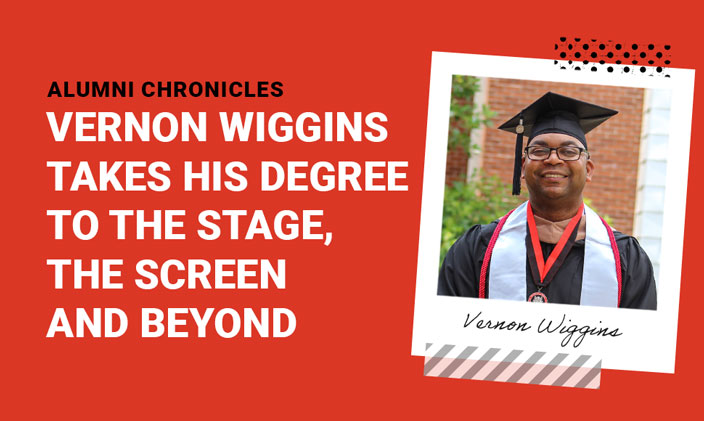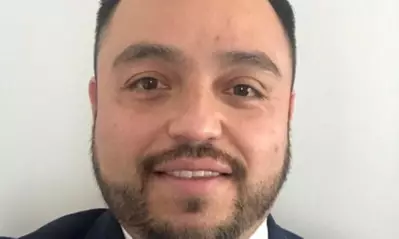UOPX alumni spotlight: Cesar Ramirez

Written by Stephanie Hoselton

As a rule, playing hooky doesn’t presage academic success. But for Cesar Ramirez (BSM, 2008; MBA, 2009), missing a day during his junior year of high school led to life-changing educational and career connections.
“I was just a poor kid from the South Bronx,” says Ramirez. “When I was growing up, college was really for people who could either afford it or came from a different world. Most in my neighborhood went into the military, got jobs straight out of high school or became blue-collar workers.”
Even with those odds, Ramirez wanted to go to college. So, when he caught wind of a local college fair, Ramirez asked his guidance counselor for permission to miss school and attend. His counselor had other ideas. “He thought I would be better suited [for] trade school,” says Ramirez. After the counselor denied permission, “I cut school that day.”
The guidance counselor attended the college fair too, so Ramirez carefully avoided him. Mostly, Ramirez visited the community college tables until someone hollered, “Young man with the Yankees hat!”
“I took a glance at the table he was representing,” Ramirez says. “I said, ‘I’m sorry, sir. I can’t even spell Yale.’” The man’s response? He told Ramirez never to say such things.
A perspective-changing conversation
The conversation that ensued would shape Ramirez’s life in many ways. Ramirez shared his dream of becoming a lawyer. Come to find out, the gentleman he was speaking with had clerked for a state Supreme Court judge.
Just when Ramirez was about to grab the representative’s contact information, the guidance counselor placed a hand on Ramirez’s shoulder. He had been caught.
Back at school, Ramirez was in the principal’s office awaiting the consequence for cutting class when the Yale representative showed up saying he was “Cesar’s attorney.”
Ramirez was still punished for missing school, but “Cesar’s attorney,” a judge who would eventually become a New York State Supreme Court justice, asked Ramirez to sit alongside him in court for one hour every Tuesday and Thursday.
“It was probably the most exhilarating experience I ever had,” Ramirez remembers. Together, they created a program called LEYES, which means laws in Spanish and is an acronym for Legal Education Youth Empowerment Services. The group taught urban students their rights and exposed them to the legal profession.
Ramirez’s passion for the courtroom kept growing. He started competing in debates and mock trials and was assigned now Supreme Court Justice Sonia Sotomayor as his mentor. (She was working in the state court system at that time.) More than ever, Ramirez was convinced college was the next step.
Everything changed, though, as Ramirez finished high school, and his father became seriously ill. Ramirez remembers having a wonderful relationship with his dad, who was a Vietnam veteran.
“He was my beacon, my example,” says Ramirez.
Ramirez knew that going to college would put a financial and emotional burden on his parents as they grappled with his dad’s illness. Not wanting to give up entirely, Ramirez found a solution that would honor his father’s legacy while also offering the possibility of college down the road. He enlisted in the Army.
Back on track
After nearly seven years of service, Ramirez left the military and secured a job as an administrator at NYU Downtown Hospital, which was just steps away from the World Trade Center. The 9/11 attacks happened shortly thereafter.
“Living in New York was very expensive, so I had a full-time job and then [9/11] happened, and it was never the right time to go to school,” says Ramirez. “I just wondered, ‘When am I going to get the break to go to school?’”
Ramirez decided to leave the city and follow his friends to Florida: “I took whatever was in my bank account, put it in my pocket, whatever I could fit in one bag, bought a one-way ticket and moved to Florida!”
But things weren’t as easy as Ramirez had hoped. He enrolled at the University of South Florida but needed to find a job, pay rent and make his car payment. Ramirez found himself working again, wondering where school would fit into the equation.
Ramirez tried the traditional route at USF, but “class wasn’t scheduled at the time when I needed it to be, and at one point, I just gave up,” he says.
Ramirez worked at Verizon and Target before landing an entry-level role at Citibank. He noticed how anyone in a higher position at the bank held a higher-ed degree. His drive to go to college resurfaced.
Fortunately, fate intervened once again with an educational fair. This time, it was a University of Phoenix representative who changed his life.
The college dream realized
Ramirez tried to convince the UOPX representative that he didn’t have the time, but the representative persistently explained that University of Phoenix offers programs that accommodate students’ schedules. It wouldn’t be easy, the representative said, but it was absolutely doable.
Ramirez was listening. He visited a UOPX Florida location to meet the teachers and deans. “I was impressed,” he says. “The key thing that sold it for me was that I didn’t have to give up working and making sure I could pay the bills.”
Ramirez enrolled in the bachelor’s program for night classes — and the UOPX representative was right. It wasn’t easy. Ramirez worked from 8 a.m. to 5 p.m., then attended class from 6 to 10 at night. He liked the cadence of taking one class at a time for a few weeks and then moving on to the next one, rather than taking multiple classes at once but for a longer period of time.
Ramirez completed his Bachelor of Science in Management in under four years. He took advantage of his momentum and jumped right into the Master of Business Administration
, which he completed the following year.
Swimming with the sharks
Achieving his degrees gave Ramirez “the confidence that I can swim with the sharks,” he says. He explained to his manager that they “got him on a discount”: He came in as a contract employee but was now credentialed with bachelor’s and master’s degrees. That, he argued, merited a salary commensurate with these accomplishments.
Citibank didn’t agree. “They couldn’t see past the guy they hired in the beginning,” Ramirez recalls. “They didn’t see Cesar, the scholar, the guy with the MBA.” Ramirez left for another major bank. He was offered an officer-grade position that aligned with his salary expectations, and he worked his way up to assistant vice president.
All the while, Ramirez remained grateful to Citi because it provided him an employer tuition benefit that made it financially feasible for him to earn his two higher education degrees. Thus, when a Citibank recruiter contacted Ramirez, he was intrigued.
He used his confidence and turned the tables. He explained how Citi had made an initial investment in him (making him a University of Phoenix alum) and yet allowed a competitor to take advantage of the investment.
“Why not continue to make an investment in me?” he asked. “It would be in your best interest to bring me back and demonstrate how investing in someone’s career is beneficial. I could be that poster child for you.”
Going full circle
The recruiter took the bait. Ramirez was hired back and, in an interesting twist of fate, recently promoted to vice president – legal business risk & control officer, based in Tampa.
Ramirez continues to look forward while acknowledging his roots. He teamed up with a professional career mentor, Sergio Waldeck, when Waldeck moved to Tampa. Together, they created a business resource network that focuses on recruiting and retaining Hispanic professionals in the finance sector.
“Both growing up with humble beginnings, Cesar and I were aligned in making it easier for the future generation to grow, develop, get recruited and land corporate jobs,” Waldeck says.
Waldeck and Ramirez are also involved with Prospanica , a national organization of Hispanic professionals. Through their years of partnership, Waldeck says that Ramirez has taught him “no matter how hectic life gets, you should always help when you are able to assist.”
Ramirez implements this philosophy at home too. His two daughters have the educational opportunities he did not. They “know college is part of the journey,” he says. “The idea that school stops at high school is foreign to them.”
Case in point: His oldest daughter earned a bachelor’s degree in film at Columbia University and is pursuing her master’s in marketing at DePaul. Ramirez’s younger daughter wants to be an artist and a lawyer — the latter a dream that flickers in his own soul.
“I do have a little bit of an itch and wondered if it’s too late for me to consider law school,” he says.
Ramirez recently took the LSAT to get a realistic sense for the task ahead. He scored decently and is thinking of taking a prep course. In his current role, Ramirez supports some of the many lawyers employed by Citibank. Maybe one day, the poor kid from the Bronx, now UOPX alumnus Cesar Ramirez, won’t be supporting them, but working as one of them.
Find out if your employer is one of the more than 1,500 organizations University of Phoenix works with to offer education benefits.
Meet Phoenixes like Cesar. Make connections, build relationships and be part of a growing community. Join a chapter.

ABOUT THE AUTHOR
Stephanie Hoselton has always enjoyed a good story. She gained an English degree from Texas A&M University with the plan to teach or write. As life happens, she fell into recruiting and didn’t look back. Stephanie spent over a decade in agency recruiting, placing candidates at SAP, Verizon and across financial services and healthcare. She started in Talent Acquisition with the University of Phoenix in 2021. She loves hearing candidates tell their career stories and sharing the story that is University of Phoenix.
This article has been vetted by University of Phoenix's editorial advisory committee.
Read more about our editorial process.
Read more articles like this:


